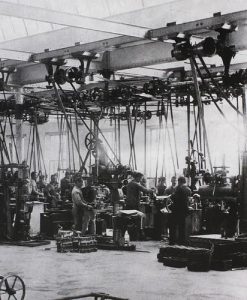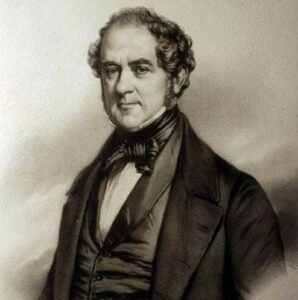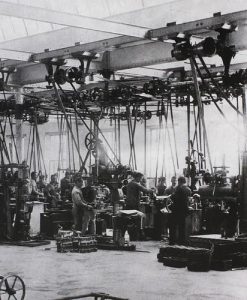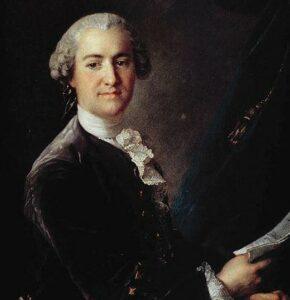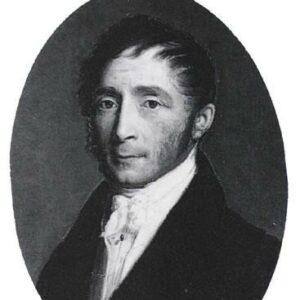Lutherans in the Montbéliard district
Originally, the Peugeot family probably came from Switzerland (one of them is mentioned as being “a bourgeois of Soleure”). Their name appears in the parish registers of the Montbéliard district as early as the XVth century, first in Vadoncourt, then in Hérimoncourt where, until the Second World War, they were elected mayors for successive generations. They became Lutherans together with the Duke of Wurttemberg, who ruled over the country at the time. They have always been closely associated with Protestantism. They were involved in the life of their parishes, very often as « Church elders ».
Protestant ethics have always been part of their upbringing and led the Peugeot family towards liberalism and concern for social welfare : even prior to 1789, they took risks in their struggle for the permanent reunion of their country with France where modern ideas dominated.
The beginnings of an industry
It was during the second half of the XVIIIth century that Jean-Pierre Peugeot – born in 1734 – took the initiative that was to lead his family towards industry.
Initially flour millers, dyers and tanners, the family began its metalwork industry in 1810. Jean-Pierre II and Jean-Frédéric, the two older sons of the first Jean-Pierre Peugeot, established – together with a son-in-law (J. Maillard-Salins for Japy) – a first company for the melting and working of steel, while their two younger brothers, Charles-Christophe and Jean-Jacques chose the textile industry.
A Peugeot patent for steel cold-rolling obtained in 1819, as well as the family-owned beech groves – propitious for wooden tool handles – soon resulted in the production of all kinds of tools for artisans, for industry and agriculture, as well as leaf springs for the clock industry and boning for ladies’ corsets.
The following generation – Jean-Pierre II’s two sons – Jules, born in 1811 and a former graduate of the École Centrale and his brother Émile, born in 1815, bought out their partners and established a new company, « Peugeot Frères » in 1851. They increased the output of the Terre-Blanche and Hérimoncourt factories, then of two more factories in Valentigney and Beaulieu, both on the banks of the River Doubs. Jules Peugeot would say « there will always be a need for nails, as well as for hammers to knock them in and pliers to pull them out ». But the brothers also manufactured light steel hoops as boning for crinolines worn by the ladies of the Second Empire.
Towards heavier industry
Nevertheless, the sons of the Peugeot Frères founders : Jules Peugeot’s son Eugène, born in 1844 and a HEC graduate, and Émile Peugeot’s son Armand, born in 1849 and an engineering graduate of the École Centrale, were to change over to heavy industry with their new company « Les Fils de Peugeot-Frères ». Their ancestors’ industrial achievements and financial caution had made this possible.
In the Beaulieu factory in 1888, their industrial capacity enabled them to begin the manufacturing of bicycles, which had lately come into fashion ; and Armand Peugeot, fascinated by what had become the peak of technical performance, decided to concentrate his efforts on motorized vehicles.
The development of the petrol engine was to make this possible : in 1890 the first Peugeot automobiles, fitted with a Daimler engine, were produced, and met with success in car racing. This industry was taken over by the sons of his cousin Eugène – Pierre, Robert and Jules – who developed it into the present day « Société des Automobiles Peugeot ».
Pioneers in the social field
Deeply influenced by their Protestant culture, the Peugeot family have always been pioneers in social welfare. Inspired by their religious convictions, Émile Peugeot and his daughter Lucy (who died in 1928) will be remembered for their commitment to the ideals of peace and charity : they created various relief organizations and were responsible for the building of a hospital in Valentigney where workers and their families could receive free medical care. The Peugeot family provided their employees with the following social benefits – long before they were to become customary or legal :
- a 10-hour working day (thirty years ahead of time),
- as from 1853, a mutual assistance society, largely financed by them,
- a policy of low-cost housing available to employees,
- professional training for young people,
- social benefits (a century before Social Security came into being),
- workers’ pensions,
- and a pension scheme for workers’ widows (since 1811).

